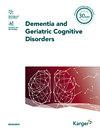Adaptation and Validation of the Person-Centred Assessment Tool for the Acute Care Setting
IF 2.2
4区 医学
Q3 CLINICAL NEUROLOGY
引用次数: 0
Abstract
Introduction: Person-centred care (PCC) is synonymous with best practice in the care of persons with dementia. Despite this, PCC is not routinely assessed, and there is no validated tool for in the acute care setting. We aimed to validate the Person-Centred Assessment Tool (P-CAT) in an acute setting. Methods: P-CAT was administered independently to a total of 161 nurses (n = 16, from a specialized dementia unit with PCC training; n = 116, geriatric wards; n = 30, medical/surgical wards). The word “residents” was replaced with “patients” in P-CAT. We employed confirmatory factor analysis with principal component extraction to verify the previously reported three- and two-factor solutions. A one-way between-groups ANOVA was then used to investigate group differences in the P-CAT score (total scale and subscale). Results: Factor analysis revealed a two-factor solution (explained variance 42.28%): (i) extent of personalizing care and (ii) amount of organizational and environmental support. Out of the 13 items, only 2 items did not load as expected. The internal consistency reliability of the scale was satisfactory (Cronbach’s α = 0.77). Nurses’ P-CAT scores were significantly different across ward settings [Welch’s F(2,37.20) = 13.01, p < 0.001, ω2 = 0.09], with the highest among those PCC trained. Post hoc analyses revealed a significant difference in mean subscale scores between PCC-trained nurses and nurses from the other two ward settings. P-CAT scores were not significantly correlated with age, r(159) = 0.01, p = 0.861, or with nursing experience, r(159) = 0.04, p = 0.615. Discussion/Conclusion: P-CAT possesses adequate validity and reliability as a quantitative assessment tool of PCC in the acute care setting.以人为中心的评估工具在急性护理环境中的适应性和验证
导言:以人为本的护理(PCC)是痴呆症患者护理最佳实践的代名词。尽管如此,PCC并没有被常规评估,在急性护理环境中也没有有效的工具。我们的目的是在急性环境中验证以人为本的评估工具(P-CAT)。方法:对接受过PCC培训的痴呆专科病房的161名护士(n = 16)单独实施P-CAT;老年病房116例;N = 30,内科/外科病房)。P-CAT中的“residents”一词被替换为“patients”。我们采用验证性因子分析与主成分提取来验证先前报道的三因素和两因素解决方案。然后使用单因素组间方差分析来调查P-CAT评分(总量表和子量表)的组间差异。结果:因子分析结果显示:(i)个性化护理程度和(ii)组织和环境支持量为双因素解决方案(解释方差为42.28%)。在13个项目中,只有2个项目没有按预期加载。量表的内部一致性信度令人满意(Cronbach’s α = 0.77)。不同病区护士p - cat得分差异有统计学意义[Welch’s F(2,37.20) = 13.01, p < 0.001, ω2 = 0.09],其中PCC训练组得分最高。事后分析显示,接受过pcc培训的护士和其他两个病房的护士在平均分量表得分上有显著差异。p - cat评分与年龄无显著相关,r(159) = 0.01, p = 0.861;与护理经验无显著相关,r(159) = 0.04, p = 0.615。讨论/结论:P-CAT作为急性护理环境中PCC的定量评估工具具有足够的效度和信度。
本文章由计算机程序翻译,如有差异,请以英文原文为准。
求助全文
约1分钟内获得全文
求助全文
来源期刊
CiteScore
4.70
自引率
0.00%
发文量
46
审稿时长
2 months
期刊介绍:
As a unique forum devoted exclusively to the study of cognitive dysfunction, ''Dementia and Geriatric Cognitive Disorders'' concentrates on Alzheimer’s and Parkinson’s disease, Huntington’s chorea and other neurodegenerative diseases. The journal draws from diverse related research disciplines such as psychogeriatrics, neuropsychology, clinical neurology, morphology, physiology, genetic molecular biology, pathology, biochemistry, immunology, pharmacology and pharmaceutics. Strong emphasis is placed on the publication of research findings from animal studies which are complemented by clinical and therapeutic experience to give an overall appreciation of the field.

 求助内容:
求助内容: 应助结果提醒方式:
应助结果提醒方式:


